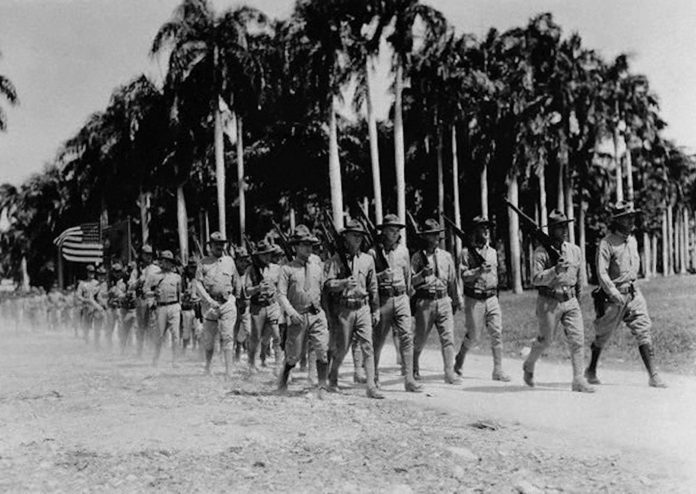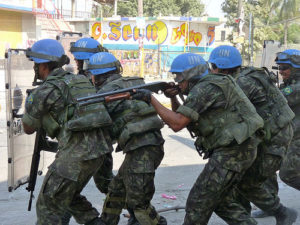
The influence of what is called, with deceptive ease, the “international community” determines Haitians’ present and future, largely due to the deficit of national sovereignty and legitimacy that taints the Haitian authorities which act as intermediaries.
This “international community” supposedly accompanies Haiti on its quest for democracy, sharing her concerns and uncertainties. But its overbearing influence is troubling. Is it not a little contradictory for Haiti, under the control of United Nations troops, to think about defining its own foreign policy? Is it not a phony posture, in this context of moral decay, to talk about formulating a foreign policy that takes into account Haiti’s interests and aspirations?
Could this be nationalism? For a country which is completely financially dependent on the “international community,” wouldn’t it be utopian obstinacy for Haiti to think of forging new relations with it? Would Haitian authorities be ungrateful to think of solving their people’s problems by insisting on a sovereign and autonomous approach?
Haitian nationalism, although in crisis, exists; it has always asserted itself despite the preponderance of the “international community.” Like Haiti, the “international community” talks about the values of freedom, equality, and independence throughout the world and in international fora. But the burdensome influence of the “international community” erodes any capacity for endogenous development. Haiti grows nostalgic for its status as a pioneering state with a reputation for defending the oppressed.
The “international community,” which is guided by powerful nation-states, gives itself the right to impose its notion of democracy on societies. It pretends to be committed to restoring the rule of law through using the United Nations, the embodiment of international legitimacy. And Chapter VII of the UN Charter is explicit on the conditions under which the “international community” can legitimately use force in a territory where threats to international security exist. The “international community” violated these rules and principles when the United Nations member states authorized their own foreign intervention in Haiti in 1994 to bring back a legitimately elected president who was overthrown by a coup d’etat. They then broke the rules again in 2004 to terminate the mandate of this same president, violating international law and the Haitian Constitution by deploying the military force known as the United Nations Mission to Stabilize Haiti (MINUSTAH).
But it must be recognized that the UN was acting on behalf of the U.S. government. We note that the United States’ supposed defense of democracy is accompanied by an hegemony which smothers Haiti. One cannot deny the importance of some U.S. contributions to democracy in Haiti since the 1980s when there was a dynamic movement of local and external socio-political forces. However, the North American contribution was diluted and negated by its underlying policy of colonization. If the “international community” and the United States remain engaged in Haiti, we must rethink how to counter their influence.

Sovereignty and independence were central elements of Haiti’s foreign policy from 1804 to 1915. Haiti’s founders’ speeches defined the broad lines of Haitian diplomacy. Haiti, until the 1915 U.S. occupation, defended itself, paid for its own army, to used this power to implement far-reaching economic reforms. But by 1890, there was an urgent need to modernize traditional society. There was “the concomitant failure of the start of the modernization process,” which Lesly Manigat analyzed. This was a multi-dimensional crisis: “an agrarian and agro-food crisis, a crisis in the organization of the unmastered and non-integrated national space, an export crisis, a financial crisis, a partially exogenous crisis, a social crisis, a psychological and moral crisis, and a political crisis. (Lesly F. Manigat, The Contemporary Haitian Crisis or Haiti of the 1990s: A Grid of Intelligibility for the Present Crisis, Port-au-Prince, 1995, p.141). There was also the global crisis of 1890-1893, which entailed the bankruptcy of banks, the collapse of Haitian coffee’s price, the disappearance of the most famous companies of European origin, and increasing poverty, forcing people to emigrate to Cuba and the Dominican Republic.
Haiti resigned itself to renouncing its sovereignty, if we give any credence to the words of Tancrède Auguste and Justin Dévot. The former said: “We will inevitably fall into the hands of the Americans; so let’s just do it now. We might be able to hold on for another dozen years, but why prolong our agony? (October 1, 1896). The latter said: “This country must have a foreign master.” (1914). (Manigat, Id. P.151)
Neither the occupiers nor the elites who favored the occupation had any clearly defined agenda in modernizing Haiti, even if certain achievements in health and agriculture must be recognized. But the Haitian peasantry paid a heavy price for resisting and opposing the U.S. capture of Haiti’s national sovereignty.
A reconstructed diplomacy, in search of opportunities
From the U.S. occupation up until the Duvalier period, Haitian diplomacy practically never criticized the United States, France, or England. But when the decolonization period began in the 1960s, there emerged a slightly more independent tone in Haitian diplomacy, which criticized France’s colonial inclinations and trumpeted the influence of Haiti’s example in Africa. François Duvalier’s diplomacy, which was very anti-communist and concerned with the construction of a patron-client relationships, was dictated by the quest for material resources and survival, even as he demagogically used Dessalinien rhetoric of independence.
Duvalier’s welcoming Sékou Touré to Haiti was the pinnacle of his critique of colonialism; the African spit in the face of General de Gaulle by making a quote which was probably inspired by Dessalines: “We prefer poverty in freedom to wealth in slavery.” Guinea was the only member of the French Union to vote “no” in the referendum of Sep. 28, 1958. It sought the support of the black rulers, and François Duvalier took advantage of this to assert himself on the Caribbean scene which changed after the Kennedy assassination and the fall of Juan Bosch (November 1963). Duvalier then tried to circumvent President Lyndon Johnson’s non-support of his regime by seeking aid from countries like Germany, Italy, Nationalist China, and France.
But since 1986, few Haitian presidents have been able to forge an autonomous Haitian diplomacy. Nevertheless, three have sent contradictory signals combining autonomy and the exercise of unchallenged sovereignty with the United States (Lesly Manigat), voluntarism (restoration of diplomatic relations with Cuba by Jean-Bertrand Aristide) and René Préval’s policy of solidarity with Hugo Chavez, who reached out to the peoples of the Caribbean and Latin America. René Préval made efforts to resist Edmond Mulet, the representative of the UN Secretary General in Haiti, and the U.S. Embassy, but U.S. domination was reinforced by the Organization of American States (OAS) and the United Nations.
As today’s new contested president is about to come to power, let us venture proposing some priorities for Haitian foreign policy. It is undoubtedly utopian.
The first priority for Haitian diplomacy is to regain our 19th century status: a sovereign nation. We are certainly in a global world where there is interdependence between states and the dependence of weak states on the “international community,” including the United States. Thus, we must reflect on how restoring sovereignty will entail reforms in the National Police, the Army, and Justice. We must think about how to secure the national territory, control the borders, and control of the flows of Haitians across the dangerous borders of neighboring states. We should undertake negotiations at the United Nations, which is responsible for the spread of cholera in Haiti. We should seek full reparations, preceded by an extensive dialogue with diplomats from Latin America, Africa, and Asia, on the need for Haiti to regain its sovereignty. The restoration of sovereignty is a prerequisite to a sovereign foreign policy.
It is a fact that Haiti is a weak state with widespread institutional collapse. But weakness is not a fatality. Other countries have had the courage to overcome the overwhelming influence of foreign powers. This requires having responsible, courageous, and patriotic elites. History is not erased, but it is subject to moments of rewriting. Haiti, to ensure its survival, must take a new trajectory and redesign its relations to the world through diplomacy on all levels. The freedom of ideas and the freedom of Haitian elites’ movement in the age of globalization are powerful guarantees for the emergence of autonomous thinking that corresponds to the Haitian soul.
The second priority is change the relationships Haiti has had. Three priorities emerge: rethinking relations with the United States of America without fear or rupture, rebuilding relations with Africa and Europe in search of fruitful synergy, and revising relations with the Dominican Republic which meet Haiti’s aspirations by safeguarding its interests, and by reaching a moratorium on the expulsion of Haitian migrants. To achieve this, Haitian intellectuals present in foreign universities, adhering to Anglo-Saxon academic research centers, rebuilding civil society, revitalizing peasant forces in Haiti, militating in Haiti’s diaspora, these are the assets on which Haiti must rely.









